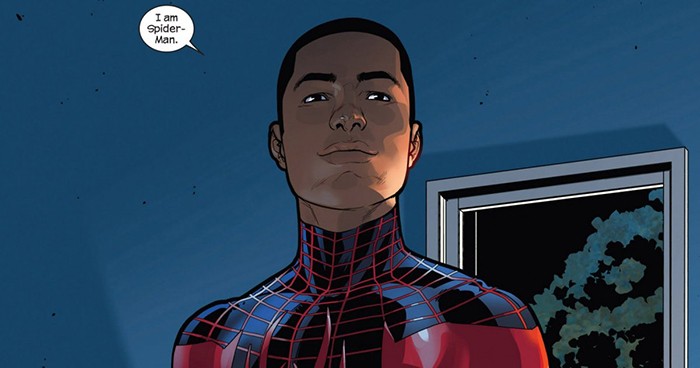Marvel Exec Blames Diversity For Comic Sales Slump: We're "Not About Politics"
Marvel Comics has been praised recently for its uptick in diverse characters, the executives are now blaming diversity for the downturn in comic book sales.
The Marvel Retailers Summit was intended as a meeting between Marvel executives and retailers, but when Marvel allowed website ICv2 to report on the summit, it spawned a surge of outrageous headlines about Marvel's business practices, including the inner circle's real thoughts on the push for diversity.
Things aren't looking so good lately for Marvel's sales, which have taken a sharp dip since October. Vice President of Sales David Gabriel entertained the notion that the sales drop could have been caused by a number of factors — the economy, Marvel's too-many titles, general consumer unease after Donald Trump's shocking election in November — but he pointed the finger mostly at one factor: readers' changing tastes. That's presumably executive speak for "readers don't like diversity," as Gabriel goes on to describe to ICv2:
"What we heard was that people didn't want any more diversity. They didn't want female characters out there. That's what we heard, whether we believe that or not. I don't know that that's really true, but that's what we saw in sales.
We saw the sales of any character that was diverse, any character that was new, our female characters, anything that was not a core Marvel character, people were turning their nose up against. That was difficult for us because we had a lot of fresh, new, exciting ideas that we were trying to get out and nothing new really worked."
Marvel Comics had been shaking up their superhero lineup with more women and people of color since Miles Morales stepped into Spider-Man's webbed suit in 2011. Soon to follow was Ms. Marvel, who was now Kamala Khan, a Muslim girl from Jersey City; a female Thor; Korean-American Amadeus Cho as the new Hulk; and black teen Riri Williams as the new Iron Man. These titles were critically lauded, and many saw these diverse characters stepping up as legacy superheroes as the beginning of a new wave for comic books.
 Fortune Magazine certainly thought so, publishing a gushing profile of Marvel Editor-in-Chief Axel Alonso and Marvel's push for diversity right before the news broke out about Gabriel's anti-diversity comments — an ironic twist of fate that many readers noticed.
Fortune Magazine certainly thought so, publishing a gushing profile of Marvel Editor-in-Chief Axel Alonso and Marvel's push for diversity right before the news broke out about Gabriel's anti-diversity comments — an ironic twist of fate that many readers noticed.
"Our creators are itching to show you the world outside your window," Alonso told Fortune in the profile. "The rush to diversify characters has more to do with business than politics, in Alonso's telling," Fortune Magazine assures its readers.
And what did Alonso have to say about diversity at the retailers summit?
"We've gone through a period where in pop culture as a whole (and you guys notice that as much as we do), there's been this massive discussion about inclusion and diversity ... But Marvel is not about politics. We are about telling stories about the world. I think we are an extension of what Stan [Lee] did. When I look at what we're looking to do, we're looking to tell stories that matter in this time. That's the most important thing."
Sounds to me like Alonso is using the same words to assure two groups of people of different things: throwing out the all-encompassing "politics" as a dirty word that is the antithesis of good storytelling. But politics is ingrained in the superhero genre, because comics have always been about politics. Superman was created by two Jewish refugees, Captain America was punching Nazis during World War II, Green Arrow is quite literally a "social justice warrior."
Diversity and changes in the "classic superhero" lineup have and always will be an easy target for comic book executives when sales begin to drop, but as io9 points out, Marvel certainly does have some problems with their editorial model. They launched 12 different events and crossovers in the past two years, increased the cost of single issues, pumped out new titles and frequently shuffled artists and writers from book-to-book. Even the most avid comic book fan would be exhausted by the constant changes.
But sure, blame diversity.
